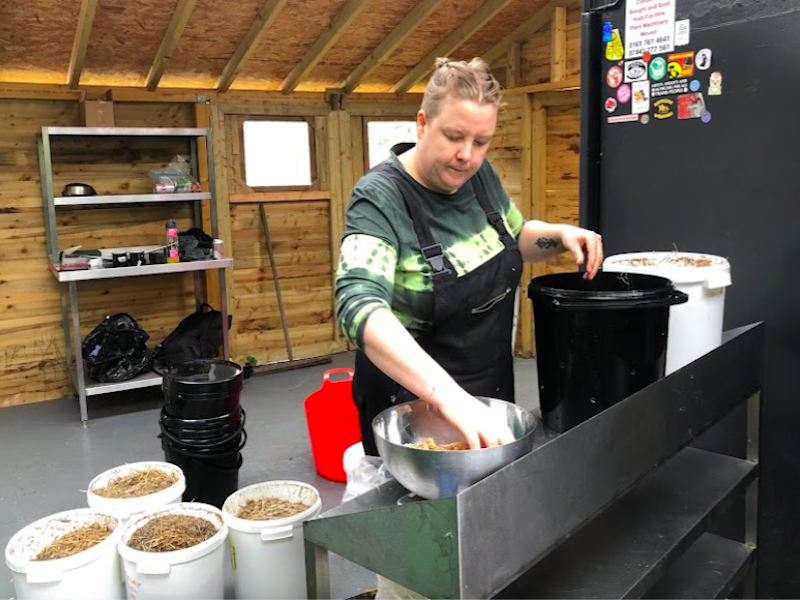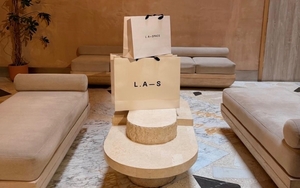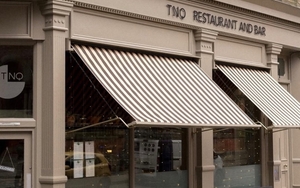From supplying restaurants to exploring new materials, the future is shroomy
“If you head to Where The Light Gets In and go to the church opposite and give me a call I can come and let you in. We’re through a kind of disused shop.”
Stockport Fungi founder Alex tells me, when I organise to go and see her mushroom growing operation. The clandestine charm continues when sitting on the church steps, I spot the shutter of a shop doorway unexpectedly spring up, with a smiling Alex appearing in the doorway. Inside, Alex grows mushrooms that will be eaten in celebrated restaurants across Manchester.
Now we’ve come to a state of acceptance that they’re a fundamental part of the ecology and this perceived weirdness is really important
Stockport Fungi, alongside Polyspore and Myco Manchester Mushroom Co-op, are part of a thriving Manchester gourmet mushroom scene. A group of independent, self-taught DIY growers supplying celebrated local restaurants as well as educating the people of the city about the exciting potential of fungi.
Mushrooms for eating, building and connecting
“We were at home, and we just grew some oyster and lions mane mushrooms,” Mike, co-founder of Polyspore tells me, as he walks me around the company’s HQ near Navigation Road in Altrincham.
“Lorcán Kan, a chef who was at Where The Light Gets In, messaged us and was like, you’ve got to give us some Lion’s Mane. They were our first customer and from there it was plain sailing.”
Polyspore began, like all three of the Manchester mushroom growers I speak to, as a DIY operation. Mike and Dylan, started with a five-tier greenhouse, a desktop fan and a box of wet perlite in a damp and mouldy flat which they describe as “very Fallowfieldy.” All three remain DIY operations. A lot of graft goes into those mushrooms.
The lads now operate out of a small warehouse space in Altrincham, supplying a variety of mushrooms (including King Blue, Black King Pearl, Blue Oyster, Watercolour Oyster, King Oyster, Bears Head, Pioppino, Golden Enoki) to the likes of Where The Light Gets In, Another Hand, Libertine and The Alan. They deliver their freshly harvested mushrooms themselves on a cargo bike known as “the whip”.
In simple terms, these DIY spaces are designed for the following process. You add a fungi sample to a nutritious material and you let it grow. You then build it up, to the point of essentially having a bag’s worth of it.
You then inoculate pre-sterilised growth material (substrate). Let’s say in this instance it’s a mixture of oats, coffee husks and soya bean hulls. A waste product from somewhere else. You then put these bricks of fungi and material in a controlled environment (usually a tent) that mimics a natural habitat - the bark of a tree perhaps - and then you leave them to grow.
Harvest accordingly and sell to restaurants. Polyspore currently grows eleven varieties, producing roughly 25kg of mushrooms per week, selling to six restaurants. Soon they aim to be producing 45kg.
The power of mushrooms
On one hand, mushrooms represent food. Stockport Fungi supplies mushrooms to restaurants including the likes of Café San Juan, Where The Light Gets In (one of the most hyperlocal exchanges of produce in Manchester), Stretford Canteen, OSMA and Street Urchin. Due to the temperamental nature of mushrooms, these relationships are based on a mutual agreement - what is grown is what you get.
On the other hand mushrooms have the potential to be more than that. Seconds after walking into Stockport Fungi’s growing space, Alex pulls a bowl out of an oven that has been made from mycelium (the fibrous root-like structure of fungus). A Golden Reishi mushroom has fruited in the base of the bowl. An experiment at this point, Alex plans to add leftover ground oyster shells from upstairs to strengthen the material.
Once sanded down, you’ve got some pretty unique bowls. A former model maker, Alex sees serious creative potential in the material.
Over in Fallowfield, mushrooms are connecting people in other ways. Myco Manchester Mushroom Cooperative, grows mushrooms out of its farm in Platt Fields Market Garden. The cooperative is made up of five growers and as well as growing food, Myco organises growing workshops, mushroom identification walks and a host of community-minded events. Myco hopes to add a community lab to its base in Fallowfield to open up the study of mycology to the public too.
“A lot of people can’t afford to go to university and even if they have been already, it’s not easy to get back into doing this sort of stuff.” Sølvi from Myco says. “We’re inspired by the history of mycology which has been led by citizen science and outsiders.”
Workshops, microwave rice and symbolism
“A lot of the creative and low-tech ways we grow mushrooms definitely come from magic mushroom farmers or people,” Alex from Stockport Fungi says. “And when I say people, I mean 15-year-old boys growing them under their beds.”
You can’t talk about mushrooms without mentioning the magic variety. Alex gets it all the time at the workshops she runs. She strongly advises against anyone attempting to grow magic mushrooms in light of their Class A drug status and the seven years in prison you would get if caught. The impact of others growing them however is undeniable.
There’s entire Reddit forums dedicated to growing mushrooms in packets of microwave rice. The packets are an energy source, they’ve been sterilised and are moist. A little window in the bottom of the packet lets you see how everything’s getting on. The likes of Polyspore, Stockport Fungi and Myco are essentially taking these simple practises and reproducing them on a larger scale.
Whilst Polyspore aims to increase production, Stockport Fungi hopes to move further into workshops. “With the workshops we want to demystify it and show how fun it is. We do the workshops with old buckets and because everything we use is recycled, it’s all really cheap,” says Alex.
Stockport Fungi are booked up until the end of the year with workshops at the likes of HOME, Track Taproom and Ashby’s greengrocers in Sale. Alex has further plans to do workshops in schools too, encouraging more people to consider growing mushrooms.
The workshops are popular. Alex cites the popularity of the 2019 Netflix documentary Fantastic Fungi as one of many reasons for an increased interest worldwide over recent years. As well as the craft movement and a heightened awareness of issues surrounding sustainability.
People are also realising the benefits of mushrooms in general. Mushrooms are cheap to produce. They don’t use much energy to produce. They grow quickly (oyster mushrooms in around ten days to two weeks). They use up waste products. They are nutritious. They are a great meat substitute. They have medicinal value. The list goes on.

Perhaps our love of mushrooms goes a little deeper than we think. Fallowfield’s Myco is an important space for many people. The five growers involved all identify as trans and are disabled or neurodivergent. Sølvi tells me that a lot of queer and LGBTQ+ people attend sessions knowing that Myco is a safe space but also because of what mushrooms represent.
“I think it strikes a nerve with a lot of queer people. You know, we grow up thinking mushrooms other than the ones we’ve got in our food are really weird and kind of dangerous.” Sølvi says.
“Now we’ve come to a state of acceptance that they’re a fundamental part of the ecology and this perceived weirdness is really important.”
Follow Davey on Twitter and Instagram: @dbretteats













